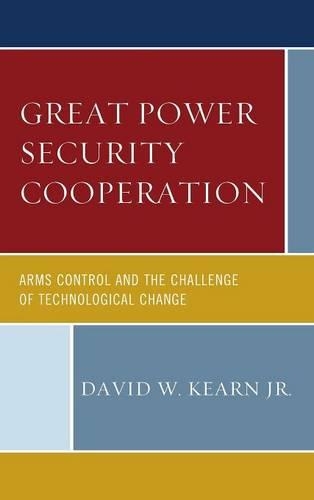
Great Power Security Cooperation: Arms Control and the Challenge of Technological Change
(Hardback)
Publishing Details
Great Power Security Cooperation: Arms Control and the Challenge of Technological Change
By (Author) David W. Kearn
Bloomsbury Publishing PLC
Lexington Books
18th December 2014
United States
Classifications
Professional and Scholarly
Non Fiction
327.174
Physical Properties
Hardback
250
Width 163mm, Height 238mm, Spine 24mm
508g
Description
This book explains the conditions under which great powers are likely to cooperate to improve their security by engaging in qualitative arms control. In agreeing to limit or proscribe certain classes of weapons, states will constrain their military capabilities and therefore decrease the threat they pose to potential adversaries. Focusing on the expected military impact of technological change and the capacity of states to confidently monitor the activities of its negotiating partners, it may be possible to forge lasting agreements that improves the security of the participating states. However, at other times, the nature technological change may force states to engage in competitive behavior, precluding cooperation and increasing the probability of conflict. Examining a diverse set of cases, including the Washington Naval Conference, The World Disarmament Conference at Geneva, the Baruch Plan for the International Control of Atomic Energy, and the SALT I Accords (including the ABM Treaty), this volume presents a persuasive, comprehensive and interesting contribution to the literature on arms racing and arms control, and should be of interest to students of international relations theory and security studies. By presenting a theoretical-informed model that explicitly links the security strategies of states to their choices about development and deployment of new weapons and, consequently, their willingness to engage in arms control cooperation, this book provides an important refinement upon existing theoretical and historical approaches.
Reviews
A meticulous exploration of the subtle logic of qualitative arms control. Kearn delves into the historical maneuvers and machinations which the great powers have pursued so as to maximize the strategic advantages of technological change. -- Mark Zachary Taylor, Georgia Institute of Technology
David Kearn examines a question of immense policy importance what accounts for the success and failure of great power attempts to regulate their competitions in advanced weaponry by arms control. His scholarship is wide ranging. His writing style is forceful. His argumentation is convincing. His conclusions and policy projections are sobering. With the emergence of an arms competition involving the United States and the great powers of Asia, Kearns analysis could not be more timely. -- John H. Maurer, U.S. Naval War College
Author Bio
David W. Kearn is assistant professor of government and politics at St. Johns University.
